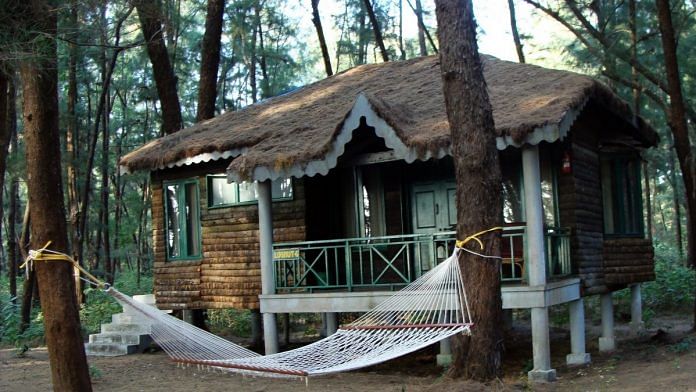The coronavirus pandemic has dealt one of the worst blows to the hospitality and tourism industry, but the seeds of a revival have started appearing – primarily driven by a rush among young professionals opting for long and short stays in hotels, resorts and homestays that are clean and affordable.
With the sector’s rich potential to create employment when lakhs have lost their jobs, the government needs to support this transformation to bring about a revival in the industry.
Over 90 per cent of India’s hotel rooms currently fall in the economy, budget, and mid-market segments and serve mostly domestic travellers, according to the Hotel Association of India. However, around 40 per cent of all hotels face currently imminent closure amid plunging room rates that have choked their capacity to repay debts.
The Narendra Modi government needs to provide tax and loan relief in the upcoming Budget so that the tourism and hospitality industry can get back up on its feet. The government can incentivise investments in hotel and tourism infrastructure, reduce procedural hassles such as the requirement of Tax Deduction Account Number for deductions and eligibility of food production, and air catering for reduced corporate tax as well as allow cash receipts from foreign tourists for transactions above Rs 2 lakh.
Also read: Pangong Tso opens for tourists amid Ladakh stand-off. This is how you can visit it
Nurture small and medium hotels
In this gloomy scenario, it becomes imperative to nurture the trend in vacation rentals. They have become increasingly popular during the pandemic because they allow tourists to maintain social distance. Hotel industry executives say that the occupancies in resort destinations like Goa are back up to 75-80 per cent.
Yet, the new standards of cleanliness, hygiene and safety that are needed entail higher costs, increasing their financial burden at a time of deep distress.
Although the government has taken measures such as rescheduling of loan repayments and moratoriums, such efforts will offer only marginal relief to a sector whose recovery may take at least a couple of years.
Several governments — like China and the European Union — have offered direct cash injection into tourism, including wage support. That may be tough for India to offer given the widespread financial stress. Still, the Narendra Modi government can undoubtedly reduce taxes in the upcoming Budget to offset hotels’ higher costs.
The Maharashtra government has been inspirational in its efforts to revive the tourism industry. It has announced that the hospitality sector will be accorded industry status effective 1 April. The state can serve as a role model for India. Though the industry status was granted by the state as far back as 1999, it remained only on paper. It has now been resurrected. It has also scrapped around 70 licences earlier required to open a restaurant to about 10, and is now moving towards single clearance.
It has not stopped at that. Maharashtra has dusted up a policy to revive beach shack tourism, conducted tours of the iconic Wankhede stadium, and will let tourists see the shooting of Bollywood films. Besides, it has embarked on agriculture tourism – from wine-making to strawberry-picking.
The trend of experiencing tourism by trying out the local culture, such as preparing a meal or painting in local traditions, will be the way forward. Foreign travellers may increasingly opt for affordable and clean properties rather than luxury ones.
Also read: Why Indian economy seems set for revival in the new year after a tough 2020
Innovative tourism
As the world gradually reopens, India will need more innovative programmes to attract the world’s travellers. While the world’s strictest lockdown has undoubtedly helped India limit the spread of the coronavirus, it is now time to reap the benefits – for which the tourism sector is best positioned.
Despite the extreme hardship faced by the sector, hotels provided yeoman service in food distribution to quarantine facilities for incoming passengers and stay for healthcare workers. It is time to recognise their contribution by allowing tax deductions for their CSR (corporate social responsibility) activities. Expenditure deduction of CSR expenses incurred by taxpayers in Section 37 of the Companies Act is not allowed for computing business income. This should be allowed.
Besides tax deductions, policymakers must form an extensive training programme for those offering homestays and small and medium-size hotels.
The hospitality sector worldwide is moving towards a new digital paradigm such as keyless rooms, digital menus, unmanned receptions and even robots offering room service.
Also read: Manipur is now on war tourism map. But preserving Koirengei airfield is key
Go local
While India has a vast potential in wellness tourism – due to ancient cures like Ayurveda and competent healthcare workers – it will need to embrace this digital revolution even at the grassroots level such as homestays and small and medium-sized hotels.
This should seamlessly integrate with iconic heritage and monuments on digital maps combined with a complete sprucing up of the infrastructure – such as roads, restaurants or even shopping destinations so that tourists are assured of their health and safety.
These should be backed by awareness campaigns so that local communities can contribute to the effort. From pristine beaches to snow-capped mountains, forts and palaces to temples and monasteries, India has everything a tourist wants. It is time to use the pandemic for scripting a turnaround.
The author is a partner at The Law Point (TLP). She was formerly the chairperson of the National Commission for Women. Views are personal.




I fully agree with the author. But sadly, the government behaves very irresponsibly by a crushing burden of taxation (250% on petrol and diesel) and not giving anything back to the local community. Much more needs to be done to encourage local economic activity. Many big fat Indian weddings have got outsourced overseas.